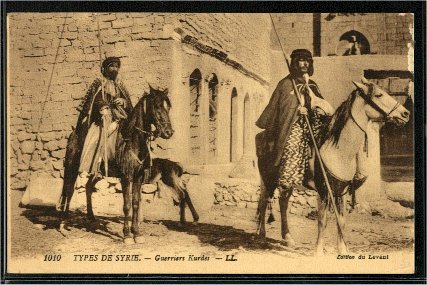
Mentionned : Syrian Characters – Kurdish warriors.
In 1960, Kemal Joumblatt gave them a “undetermined citizenship”, which allowed them to obtain for their children borned in the country to become Lebanese. But this status was cancelled in 1962 because of Christian opposition : the former supported Armenians’ naturalization but refused to give Lebanese nationality to any muslim groups, fearing to lost their demographical weight comparing with the muslims’ one.
After the death of 15 members of Turkish Safety Forces, Turkey warns again and insistes toward USA for an itnervention which will eradicate the PKK based in Southern Kurdistan.
Strangely, the situation is quite similar, concerning the casus belli, to the current Israeli attack against Lebanon : the former country, for it shelters Hebollah militias which attacked Israël, is now obliged to state in which camp it places itself.
If we only regard International rules, it is quite impossible to tolerate armed groups leading raids from its own soil against a neighbored country, without being considered as directly responsible and facing reprisals.
It is exactly the same problem in Southern Kurdistan. As so long as the PKK stays in Quandil Mountains and leads attacks in Turkey, de facto, the Region of Kurdistan, and then Iraq, could be officially considered as patronizing acts of war against its northern neighbours.
Soon or late, Lebanon will be obliged to adopt a clear position, against or the Hezbollah. But what will happen for Hewlêr ? The Israeli-Lebanese case is definitively an encouragement for a Turkish invasion.


In 2005, they celebrated Jules Verne. After all he is famous as author and translatedin all the worldbut he seems strangely associated with military planes, though Kurds have not nice memories of “bombaran”.
But they have made also many stamps figuring lighthouse, probably because of their great tradition of sailing… Then no thems is surprising. I just wonder who makes the choice and why…
However, they don’t forget to published Kurdish pictures, fortunately as we can see here and here.
Kurdish safety forces had led today an operation in Hewlêr against the party PÇDK, wich is generally considered as the PKK branch in Southern-Kurdistan (and the design of its site and flags and pictures allow us to make ourselves an opinion about that).

During the raid, 7 members of this party have been arrested. In Zakho, another PÇDK is also under arrest. For the moment the reason of this coup is unknown.
The PKK faces regularly accusation of murders against its political opponents in Kurdistan and the PÇDK is suspected to help it, especially in Sipan Rojhelat, Kemale Sor and Kani Yilmaz’s death.
Moreover the problem is more and more crucial concerning the presence of the PKK in Southern Kurdistan, for their attacks from “Iraqi” border and moutains incite step by step USA, Turkey and Kurdish Region to find a solution or at least an agreement, as explained Nêçirvan Barzani in a recent interview given to the New Anatolian :
“Cevik: The terrorist Kurdistan Workers’ Party (PKK) has become a problem for everyone, including the Iraqi Kurds. How can this problem be solved to the satisfaction of all sides?
Nechirvan Barzani: In the modern world, safe and stable borders are an absolute requirement for security and economic development. Borders must be respected by both sides and it’s not in the Kurdistan region’s interest to have a violent threat operating within it. But the problem isn’t only a military issue; it requires dialogue and concessions on all sides. Recently, the prestigious Council on Foreign Relations (CRC) in the U.S. called for a three-way dialogue with the U.S., Turkey, and Iraqi Kurdish leaders on the question of border security. We believe this is an excellent idea and we’re ready to participate if the other sides agree to begin.”
So does it showthat a new “harder” line will replace the former relative “tolerance” of the Kurdish Governement for the PKK and his satellites, or is it only a simple quarrel between the KDP and an opponent party ? let’s wait the legal accusations against the PÇDK to learn more. But the current visit of Hoshyar Zebarî, the Foreign ministry,and his press release stating that “the new Iraqi government is ready to revive three-way talks with neighboring Turkey and the United States to discuss measures to curb Turkish Kurd rebels based in northern Iraq. We discussed the need to re-activate the trilateral discussions … on containing the PKK terrorist activities on the border region,” Zebari told reporters after talks with Turkish counterpart Abdullah Gul. (…)”These will be activated in the near future … to be followed by some other measures, hopefully, in order to reinforce our joint cooperation in this area.”
According to Turkish sources, Turkey would have asked the extradition of several leaders of the PKK from Iraq.Â
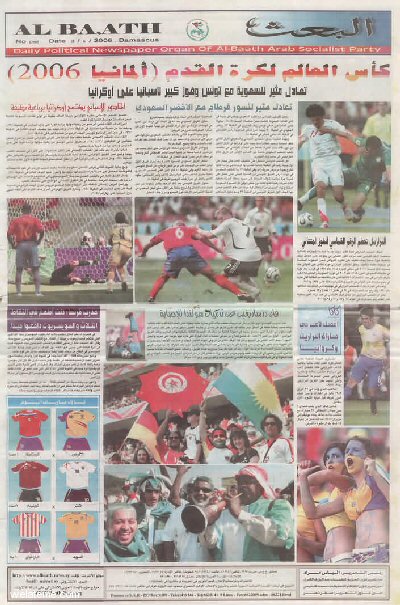
A Syrian newspaper, though very respectful of official political line, entitled “Al-Ba’ath” is threatened by judicial reprisals by the strict and humourless ARAB Syrian Republic (and death to non-Arabs) for having published a separatist Kurdish symbol.
For the first page of the newspaper published pictures of Soccer World Cup. Unfortunately, tricky Kurds enjoy to deploy Kurdish flags front of the world screens, so after Iran TV, Ba’athist news had to show these three-coloured nightmare…
Journalists risk serious judicial troubles, and their only justification is that they were not awared it was the Kurdish flag… The next time they will ask to mukhabarat (secret servces).
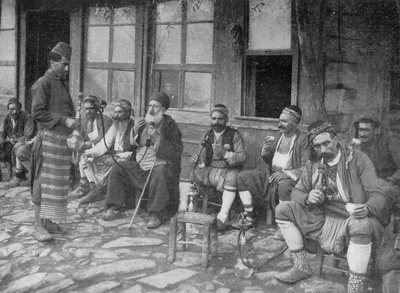
“Coffeeshop in Diyarbakir”, 1909.
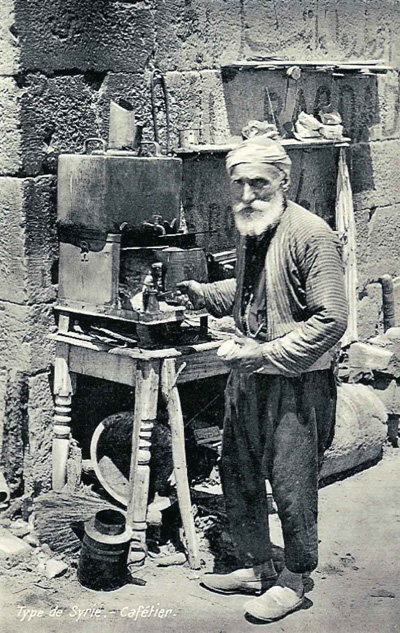
“Syrian” coffee maker.
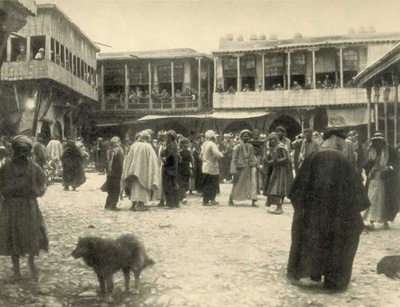
Mosul (probably a khan ?)
 in these days , every where you go people are busy with watching world cup games and you usauly see peopel shout in happines or cry in sadness for their national team’s win or loss ,in these days my friends often ask me “Who are you rooting for ?†it is very hard question to answer , so I usualy try to hide myself and not answer such a question ,… have you ever wondered who the 40 million Kurds without a country , would root for in world cup games ? it is a sad fact , that there is no football team representing Kurdistan , because Kurdistan is divided among 6 countries . if you want to know how a Kurd would follow the games please read this post .
in these days , every where you go people are busy with watching world cup games and you usauly see peopel shout in happines or cry in sadness for their national team’s win or loss ,in these days my friends often ask me “Who are you rooting for ?†it is very hard question to answer , so I usualy try to hide myself and not answer such a question ,… have you ever wondered who the 40 million Kurds without a country , would root for in world cup games ? it is a sad fact , that there is no football team representing Kurdistan , because Kurdistan is divided among 6 countries . if you want to know how a Kurd would follow the games please read this post .
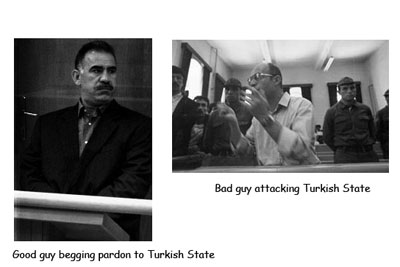
After having criticized Ismail Besikçi for his untolerable attack against Turkish State, Abdullah Öcalan has probably estimated that Turkish Police or Prosecutor are not active enough to prevent the country of a such bad guy… So he asked to his lawyers to complaint legally against the sociologist. If Öcalan was not there to defend Turkish state, who could do ??? This man is a hero…
Organized by the Kurdish Institute of Paris
Friday June 16th 2006
2h30 pm-7 h00 pm
Salle Victor Hugo
Immeuble Jacques Chaban-Delmas
101, rue de l’Université
75 007 Paris
Métro / RER : Invalides
| 2 h30 – 3 h30 : Platform I : Introduction : Iranian society today |
|---|
Moderator: Hamit Bozarslan, co-director of the Studies of muslim societies Institute, ParisSpeakers:
|
| 3h30 – 5 h30 : Platform II : The issue of non-Persian nationalities |
| Moderator : Kendal Nezan, Chairman of the Institut kurde de Paris, France Speakers:
|
| 5 h30 – 7 h00 : Platform III: Democraties facing Iranian Challenge |
| Moderator: Gérard Chaliand, specialist of geopolitics, France Speakers:
|
|
WHERE GOES IRAN ?
American interventions in Afghanistan and Irad have for effect to disencumber the Iranian Islamic Republic of two of its worst regional enemies: Talibans of Kabul and the Baasist regime of Saddam Hussein.. These interventions strenghen in Tehran the feeling of a surrending by USA and their allies, the more so as Washington publicly places Iran in its “axis of the evil” and wishes even « a change of regime », while Iranian leaders prepare themselves and prepare the country to a harsh confrontation. In a such context, reformers, who gave formerly the illusion of a possible liebral evolution within the regime, were isolated of all the powerful centers and a former in charge with the Guards of the revolution “was elected” president by the grace for Ayatollah Khomeneï, the Supreme Guide of the Islamic Revolution.. The new president defies the international community, promises to delete Israël on the map, in some speeches aiming Iranian public as all other muslim countries. Iranian regime instrumentalizes the Israeli-Arab conflict and the Iranian-Syrian, – which had been already dangerously efficient in Lebanon,- tries now to harm Iraq, where it supports in many ways both Sunni Jihadists and Baasists, as much as Shiite militias. Iran has the obvious aim to maintain an American military occupation as so long as possible in Iraq, and then to prevent it to itnervene elsewhere. In the same time, nuclear ambitions of Iran, revealed by the statement of August 2002 concerning secret sites in Natanz and Arah, cause sharp concerns, not only in the Middle East but also in Europe and in the United States, because of the highly strategic importance of this area of the world. The principal Western capitals declare “unacceptable” that Iran could access to nuclear power. After near to 4 years of various negociations and tractations diverses, what are the chances of a diplomatic solution to Irianian crisis ? What to do if, in the name of « “inalienable right to the nuclear technology” » Tehran refus any compromise and to stop its activities of uranium enrichment? What are the risks of a nuclearized Iran for the Near-East and all the world ? Are these risks worth a conflict ? What could be the consequences of a such issue for regional populations and for the world ? The answers to these questions require a better knowledge of the Iranian society, of its ethnic and national components, its various aspirations, and of the Iranian mosaic, in order to evaluate the real support of the regime and of socio-economic, political and cultural factors inside the country.With the initiative of the Kurdish Institute of Paris, Iranian and Western personalities of different backgrounds and specialized experts and journalists are invited to be expressed within the framework of a pluralist debate, and to bring their knowledges and their replies to these questions. The conference proposes to contribute to this necessary debate on the Iranian crisis, which will face significant developments and be undoubtedly the great question of international politics for the newt years with considerable consequences for the peace and the stability of the Middle East. |